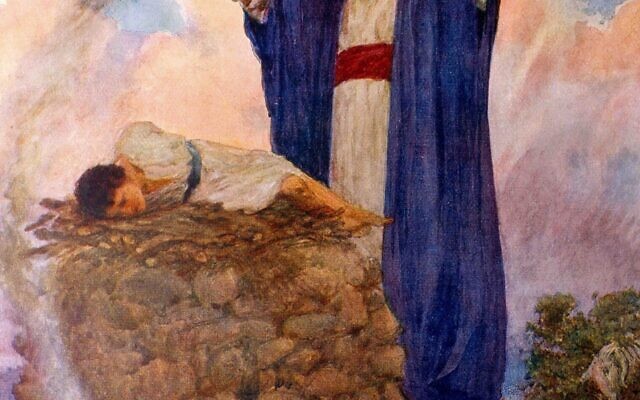Making Sense of the Sedra: Chayei Sarah
Godliness is extraordinary
In last week’s portion, Abraham seemingly passes the hardest test of his life, bringing Isaac to the brink of death before staying his hand at the command of an angel of God. Finally, he can bask in the glory of success:
“Now I know that you truly fear God” (Genesis 22:12).
But Abraham’s triumph is shattered when he arrives home to discover that his beloved wife Sarah is dead. Indeed, the narrative that follows as Abraham barters with Ephron the Hittite for a burial plot are comically mundane stacked up against the drama of the Binding. Abraham returns from Jerusalem, son and future still alive, only to find that death has outflanked him, taunting him from the threshold of his house.
More perplexing are the commentaries who regard Sarah’s death as Abraham’s tenth and final obstacle before self-perfection. After the Binding, what lesson still remained for Abraham to learn? Wasn’t Sarah’s death at a ripe old age simply an inevitable and natural occurrence, rather than a divinely arranged trial?
Another peculiarity lies in the verse: “And Abraham came to eulogise Sarah and to cry for her.” (Genesis 23:2).
In the Hebrew text, the letter ‘Kaf’ is in a smaller font than the rest of the letters in the word ‘to cry for her’. This suggests that Abraham held back when it came to mourning Sarah’s death, refraining from expressing the fullest extent of his grief. Why?
Rabbi Shmuel Sofer of Bratislava (d.1871), home of Baroque palaces, waltzes and my father-in-law, poses a brilliant solution:
Sarah is at home, awaiting her husband and son. She hears a knock. It’s a family friend who lives near Jerusalem. Breathless, this friend recounts how she had witnessed Abraham and Isaac climbing mount Moriah, knife and wood in hand. The colour drains from Sarah’s cheeks as she mistakenly concludes that her beloved child had been sacrificed! The shock of this thought kills her. The son she had anticipated for decades was gone! As Abraham strode exultantly up the front path, Isaac alive by his side, this tragedy greeted them.
What was Abraham’s tenth and final test?
Would he regret having ever left? Knowing as he then did that the shock would inadvertently cause the death of the woman who had stuck by him for a lifetime, would he have made a different decision altogether? Would he have abandoned the ninth test to prevent the tenth from happening?
This is a bittersweet sting we have all tasted. Nothing is more upsetting than the realisation that despite all our effort and acts of faith, our worst fears were still realised; our dreams still dashed. There is no greater pain than snatching defeat from the jaws of victory. And when this happens, the question facing us – as it faced Abraham – is: Do we regret having chased victory in the first place?
What indication is there that Abraham passed this test? The small ‘Kaf’. Surrounded by well-wishers who had come to soothe his grief, Abraham conceals the true depth of his pain. Not wanting to give even the slightest impression of regret, his sensitivity to God’s honour meant that he remained collected and composed, despite the maelstrom of emotions inside him.
With this, the ‘God-fearing man’ becomes a ‘Prince of God’ – a title given to him by none other than Ephron the Hittite as they negotiated Sarah’s burial plot (Genesis 23:6). Greatness in God’s eyes is remarkable. Godliness in the eyes of all who meet you is extraordinary.

Thank you for helping to make Jewish News the leading source of news and opinion for the UK Jewish community. Today we're asking for your invaluable help to continue putting our community first in everything we do.
For as little as £5 a month you can help sustain the vital work we do in celebrating and standing up for Jewish life in Britain.
Jewish News holds our community together and keeps us connected. Like a synagogue, it’s where people turn to feel part of something bigger. It also proudly shows the rest of Britain the vibrancy and rich culture of modern Jewish life.
You can make a quick and easy one-off or monthly contribution of £5, £10, £20 or any other sum you’re comfortable with.
100% of your donation will help us continue celebrating our community, in all its dynamic diversity...
Engaging
Being a community platform means so much more than producing a newspaper and website. One of our proudest roles is media partnering with our invaluable charities to amplify the outstanding work they do to help us all.
Celebrating
There’s no shortage of oys in the world but Jewish News takes every opportunity to celebrate the joys too, through projects like Night of Heroes, 40 Under 40 and other compelling countdowns that make the community kvell with pride.
Pioneering
In the first collaboration between media outlets from different faiths, Jewish News worked with British Muslim TV and Church Times to produce a list of young activists leading the way on interfaith understanding.
Campaigning
Royal Mail issued a stamp honouring Holocaust hero Sir Nicholas Winton after a Jewish News campaign attracted more than 100,000 backers. Jewish Newsalso produces special editions of the paper highlighting pressing issues including mental health and Holocaust remembrance.
Easy access
In an age when news is readily accessible, Jewish News provides high-quality content free online and offline, removing any financial barriers to connecting people.
Voice of our community to wider society
The Jewish News team regularly appears on TV, radio and on the pages of the national press to comment on stories about the Jewish community. Easy access to the paper on the streets of London also means Jewish News provides an invaluable window into the community for the country at large.
We hope you agree all this is worth preserving.






















